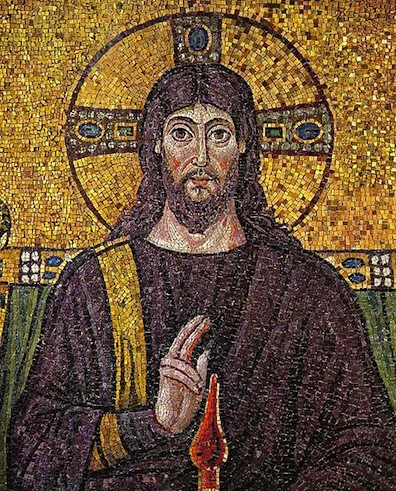Catholic priests and believers make the sign of the cross, signum
crucis, to signify faith in Christ and the Holy Trinity. A large cross is
made by touching some or all of one's fingers successively to
forehead, chest, left shoulder and right shoulder. Smaller
crosses can be made by touching forehead, lips, and chest, or
in the air facing away from the signer. The action is
typically paired with silent or spoken recitation of the words
“In the name of the Father and of the Son and of the Holy
Spirit."
Thrilled by Haines' news that the milkwoman is on her way
("The blessings of God on you!"), Mulligan speaks the verbal
formula in Telemachus as he blesses the breakfast he
is slapping down on three plates: "In nomine
Patris et Filii et Spiritus Sancti."
(Grammatically, the genitive "Spiritui Sancti" should
be used for the Holy Spirit, but Spiritus is heard
frequently in liturgical settings.) The sign of the cross is
often used in sanctifying things like church fonts, but seldom for ham and
eggs. It can also bless persons and accompany prayers.
When the priest in Lotus Eaters turns to the
congregation and blesses his kneeling parishioners, "All
crossed themselves and stood up." In Wandering
Rocks Father Conmee "crossed his breast"
while reciting the prayers in his breviary. In Telemachus
Mulligan "crossed himself piously with his thumbnail
at brow and lips and breastbone," his gesture in
this instance intended to communicate a piece of social
information to Stephen and Haines: the man exiting the swimming hole is a priest.
